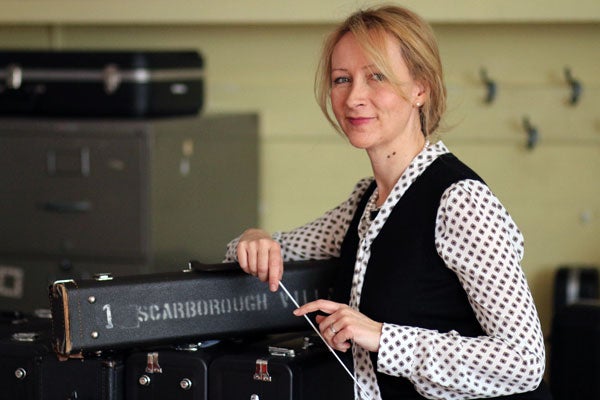
Prime Minister’s award for teaching excellence goes to PhD student
Published: October 21, 2014
Music education helps students to excel in all aspects of school life, says Susan Raponi, a doctoral candidate in music education at the University of Toronto and elementary school music teacher for grades 4-8 at George Peck Public School in Scarborough.
“Music education has been proven in research to really support literacy and numeracy because it teaches a student to focus with others,” she says. “That development of attention really develops [students] in all areas of the curriculum.”
Earlier this month, Raponi received a Prime Minister’s Award for Teaching Excellence for her approach and commitment to music education as well as her research on teaching music – including teaching students with autism or other learning challenges. (Scroll down to watch Raponi's interview with Global TV.)
“This has been really humbling for me,” says Raponi. “To have been nominated was an honour in itself, but actually winning this award was beyond anything I could have ever imagined.
“The recognition of the music teacher as a whole and the encouragement I’ve received from my peers is really heartwarming.”
Raponi spoke with the Faculty of Music’s Peter Herriman about her research and the award.
Tell us about your research.
I recently graduated from the University of Toronto with a master’s degree in music education. My field of music research focused on urban diversity, social justice issues and the transformative impact of instrumental music education in high priority urban communities.
I completed my thesis on the role of the wind band educator as community leader, integrating cultural identities and core values of communal music-making towards a new vision of a multicultural wind ensemble.
How will your work enhance music education?
I am developing a curriculum of wind band education that works on a unified numbered approach based on the first five notes of the B flat concert scale. This curriculum eliminates the staff and basic notation in order to allow students on different instruments to play music by focusing on one unified line of numbered patterns that they can play in unison, guided by the instructor.
The primary focus for my PhD studies will be in the area of elementary wind band education. I believe the development of an effective elementary wind band curriculum should inspire young people for the purpose of social transformation through the act of sharing music with others.
What are your plans to further enhance your teaching abilities and methods?
In the past, I have worked hard in creating a stimulating and innovative learning environment. I have had guest speakers work with our children, taken them on exclusive field trips where they have been invited to observe and participate in rehearsals and made lasting connections with the University of Toronto.
I am currently doing research with learning differentiated students and those students that face learning challenges through autism and a wide variety of mental health and learning disabilities.
Also, I am currently writing a new band methodology for these students that will work in conjunction with current band method books. This methodology is based on a numbered system, outside of traditional staff notation, that allows these students with challenges to play with students in a mainstream music classroom.



